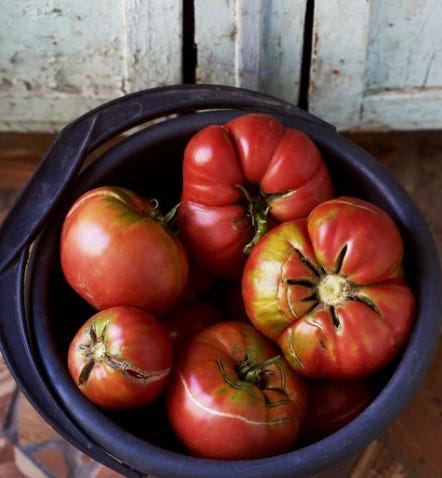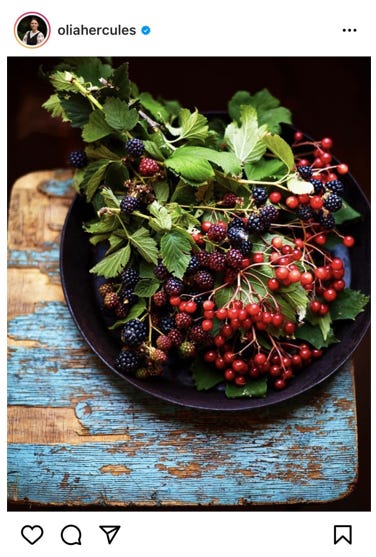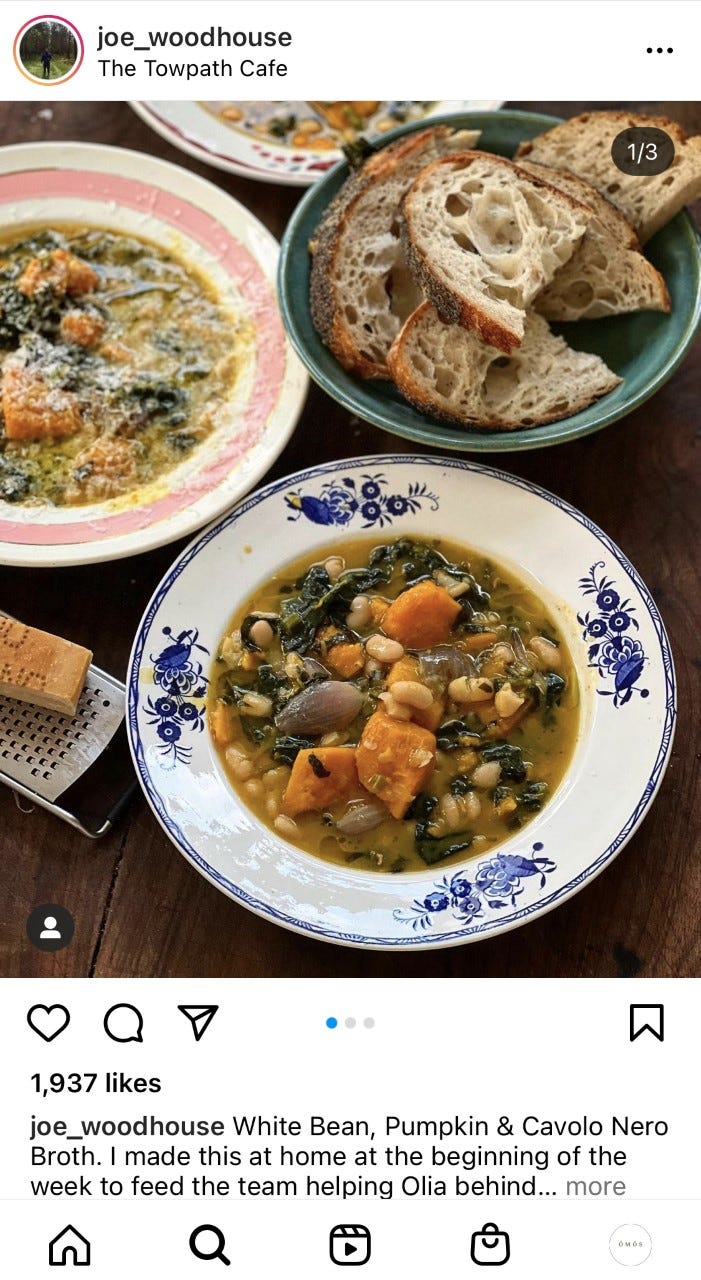147,000 euro! That's how much was collectively raised at Chefs Unite for Ukraine on Tuesday. Thanks to all of you who contributed to the #UforUkraine fundraiser led by the wonderful Cloud Picker Coffee and Allta restaurant here in Ireland. What an incredible result from this community. We are so proud that 700 euro of that was raised through the auctioning of our Ómós Foraging Kits. So thank you subscribers for your donations, shares and messages of support! This is only the beginning.
About last week…
Last week I attended La Dive Bouteille, Europe's largest natural wine festival in Saumur, set on the river Loire in North Western France. The festival gathers over 200 of Europe's finest producers and growers, fetching an audience that spans further still. A town that thrives in summer, but hibernates in the colder months, Saumur comes alive during this weekend, uniting traders, hospitality members, anarchists of the wine world, lovers of natural wine and those who enjoy too much natural wine. Glou Glou!
I had planned to tell you in great detail about this journey we had undertaken, recounting tales of the marvellous comrades and lifelong friends we had encountered (both new and old) and rekindled friendships following years of separation. We tasted upwards of 200 wines (thank god for the pronamel toothpaste) and were so fortunate to stumble upon the most unlikely of meal experiences - Saumur’s reputation for wine is not matched with its gastronomic prowess. However, as we sipped, giggled and sang into the early hours, amidst all this gallivanting, I couldn't help the unquenchable feeling of guilt. A day and a half journey from here there was a war happening.
Food for thought
As I sit at home doom-scrolling through my feed and desperately hoping for good news, I do feel some pride at having been able to contribute in some way to this horrific turn of events. Yet there’s no feeling of satisfaction, it’s more a question of what more can we do? Before this war broke out, admittedly I had little knowledge about Ukraine. No skin in the game other than being a human and fellow European. In my quest to learn more about Ukrainian culture, I searched for a podcast by Olia Hercules which was published pre-war in 2020. Olia is a food writer, storyteller and author from Ukraine based in London. Prior to this, I had not considered Ukraine as a food destination and regrettably had little concept of Ukraine’s culture beyond Google Images. Listening to Olia’s wonderful ability to depict the food culture of her nation was an extremely evocative and (for me as a listener from the future) emotional insight into her extraordinary country that she describes as not dissimilar in geographical diversity to the Galapagos Islands.
Ukraine is extremely seasonal. While growing up, Olia’s family were wholly reliant on seasonality, making use of the country's wide ranging diverse food. In the summers, the Carpathian mountains are abundant with forest berries. Thus, there exists a traditional recipe of enriched dough filled with billberrys (wild blueberries), steamed and served with toasted walnuts. The result is similar in texture to a Cantonese bao bun. Their rivers are plentiful with fresh water fish and later their forests bear the upper echelon of mushrooms like Boletus (cep/ porcini) and truffles. Corn is found throughout these parts, where a viscous dish of cornmeal called banos is typical. It’s mixed with creme fraiche, crispy lardons and local salted cheese and is remarkably similar to polenta and the traditions found in northern Italy. Down south, where Olia hails from, lies the sunkissed flat lands. A terrain which bears produce in the league of the Mediterranean. Shoulder width tomatoes, which one must place a bowl under when slicing to avoid a juice run-off that’s capable of flooding the kitchen. Following an entire winter of being sustained by pickles and preserves, she reveals the head spinning effect of biting into the first sun-sweetened cucumber of the season, twisting the vegetable straight from the vines of her mother’s vegetable patch. Widespread throughout Ukraine, each home continues this tradition of a household vegetable patch. Due to the heat, southern regions are reliant on outhouses, where produce is quickly cleaned, washed and preserved for the upcoming harsh winter.
Following the Soviet Union's demise, and in turn, years of restriction, Ukrainians found traditional food unappealing (just like in Ireland, we stopped eating fish after the famine), swapping traditional preparations for lesser quality imports. However, over the last decade, there has been a rebirth, a national outcry to reinstate culinary traditions. Olia dives into the wonders of Ukrainian unrefined sunflower oil, a condiment used to dress vegetables, bread or indeed the pickles and preserves of the winter. She describes its nutty, rounded flavour of pressed and toasted sunflower seeds to be a true delight. Dark amber in colour, it’s no comparison to low quality olive oil or mass produced sunflower oil that gives sunflowers their bad rep. It is the very essence of her country.
As a whole, the cooking of Ukraine appears diverse and differs greatly throughout the regions. I learnt when writing Bors not Borscht that Eastern countries hold beetroot in much higher regard than we do here. Ukrainian borscht is designed to be so thick that a spoon dragged through should leave a snail's trail. Furthermore, it’s never dark purple - a sacrilege in fact. The beetroots found in the south, categorised as ‘borscht beetroots', are pink in colour, giving Ukrainian borscht an entirely unique crimson appearance. Sweet, smokey black pears are often dropped into bowls of borscht, shrivelled from countless nights cooked over wood-fired embers until they resemble fermented black garlic cloves.
Mediterranean vibes, Nordic produce like crayfish, vegetable ferments, Turkish influence, a diverse restaurant scene and intact food culture not yet diluted by capitalism, the podcast concludes with Hercules highly recommending the city of Odessa by the Black Sea. A city, now in the time of writing, is in full evacuation, preparing for attack and siege. It is worth mentioning that as I was thrown into Olia’s wondrous world of Ukrainian food culture and hospitality, as so often is the case with free podcasts, we were interrupted by a sponsored advert, this time of tragic irony. A calling from UNICEF to support the children of Ukraine during this humanitarian crisis.
Chefs uniting
Amidst this research, I happened upon an unlikely collaboration between Olia and Alissa Timoshkina, a Russian food creative and food author also based in London. Their campaign is called #CookforUkraine. It encourages people to cook or bake Ukrainian and Eastern European-inspired dishes, share their pictures on social media and donate to the UNICEF Ukraine appeal via the platform. As Putin aims to suppress communication, this campaign aims to counter tackle just that. If you’re looking for inspiration, Olia’s husband Joe Woodhouse has a drool-worthy Instagram account for you to deep dive into the Eastern Galapagos cuisine of Ukraine (maybe this is where the Dublin gem Assassination Custard gets their inspo). While men gallantly protect their country on the front line, campaigns led largely by Ukrainian females are springing up all around us. The Chefs for Ukraine movement has just started the #Usupergirl initiative to help Ukrainian female chefs, front of house and other industry professionals find jobs outside of Ukraine. Hercules states that, “Everyone is rearing to be able to stay in or come back to Ukraine, to rebuild it. But in the meantime - perhaps you can help with a job placement in the UK or Europe…”
Last time I checked, Ireland was suffering from a hospitality staff crisis…
P.S. Stay tuned for Part 2 which is out on Sunday 20th March, for paid subscribers! We’ll explore how food shortages begin to directly impact the Irish supply chain, a pirate ship is called into question and just like on the front line, perhaps it's about the small wins…







